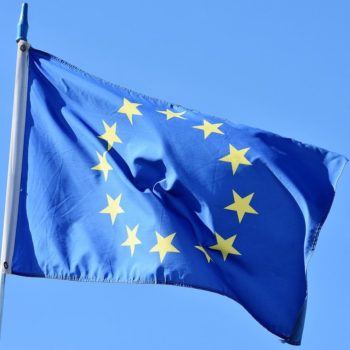EU Prepares New Legislation to Clamp Down on Big Tech; Data Misuse Key to User Distrust
by Grace Dillon on 6th Nov 2020 in News

In this weekly segment, ExchangeWire sums up key industry updates in ad tech from around the globe. In this edition: the EU Commission prepares to present new legislation that will curtail the dominance of Big Tech; research by dentsu international finds that the misuse of data is the primary source of consumer distrust in APAC; the FCC votes to affirm it will repeal the net neutrality rules implemented under the Obama administration; and Amazon sharpens its focus on video and Twitch.
EU prepares new regulations for Big Tech
The European Commission is expected to propose a significant revamp of its digital regulation that could pose a credible threat to the business models of leading tech firms. It’s anticipated that the Digital Services Act, which will be presented early next month, will mandate an overhaul of the management of content platforms. The first of its kind in two decades, the legislation seeks to make Big Tech more accountable for the content posted on their platforms and to level the playing field for smaller competitors.
Margrethe Vestager, the EU’s competition chief, elaborated that the new laws will “require digital services, especially the biggest platforms, to be open about the way they shape the digital world that we see.” Vestager explained that platforms, such as Google and Facebook, will be obliged to show the regulator what they have done to curtail and remove illegal content, as well as the rationale behind the targeted advertising that appears on their sites.
If imposed, the legislation would force Big Tech to open their closely-guarded algorithms up to scrutiny. Such a requirement would be a dramatic step in bringing Big Tech under tighter regulation – the ‘big four’ tech giants (Google, Amazon, Facebook, and Apple) have so far managed to largely dodge EU efforts to crack down on alleged anti-competitive business practices and a lack of responsibility for inflammatory or dangerous content.
Misuse of personal data the main source of consumer distrust in APAC
 A study carried out by dentsu international has found that the inappropriate used of personal data is the primary source of distrust amongst consumers in APAC. The Decoding Data Dynamics: Digital Society Index 2020 report, which was based on a survey of 32,000 people across 22 markets, revealed that one third of global consumers have opted-out of personalised email, with Hong Kong, New Zealand and Singapore all sitting above the global average.
A study carried out by dentsu international has found that the inappropriate used of personal data is the primary source of distrust amongst consumers in APAC. The Decoding Data Dynamics: Digital Society Index 2020 report, which was based on a survey of 32,000 people across 22 markets, revealed that one third of global consumers have opted-out of personalised email, with Hong Kong, New Zealand and Singapore all sitting above the global average.
Interestingly, the report found that APAC-based consumers expect new industry standards to come into effect that will grant financial rewards in exchange for their personal data. This expectation was most prevalent in China and Singapore, with 65% and 51% anticipating the introduction of some such initiative respectively. Despite this, few people have made the jump to selling their personal data, according to dentsu.
Commenting on the report’s findings, the agency concluded that growing consumer concern over the use of their personal data has only been emphasised by COVID-19. A statement from the firm read “the crisis highlights how personal data increasingly can be harnessed to enable our everyday lives in a virtual setting. Therefore, it is imperative that brands prioritise understanding the benefits and risks associated with personal data moving forward.”
FCC stands firm on scrapping net neutrality rules
 In the US, the Federal Communications Commission (FCC) has voted to affirm its decision to repeal the net neutrality rules implemented under the Obama administration. The vote, which took place last week, concludes a review ordered by the country’s federal appellate court last year.
In the US, the Federal Communications Commission (FCC) has voted to affirm its decision to repeal the net neutrality rules implemented under the Obama administration. The vote, which took place last week, concludes a review ordered by the country’s federal appellate court last year.
Approved by the FCC in 2015, the net neutrality rules barred broadband providers from stifling or outright blocking internet traffic, as well as from charging higher fees for companies to have their content prioritised. Whilst the court had agreed with the FCC’s 2017 decision to reverse the rules, it instructed the commission to review the impact the repeal would have on three key issue – public safety, broadband subsidy initiative the Lifeline program, and regulations surrounding utility poles.
In a statement, the FCC said that it “found no basis” to change its 2017 decision” with FCC chairman Ajit Pai stating that the decision to redact the rules “has been increasingly vindicated over time.”
The vote passed at 3-2, with Democratic Commissioners Jessica Rosenworcel and Geoffrey Starks, opposing the repeal. Rosenworcel criticised the decision, stating that it “put the agency on the wrong side of the public, the wrong side of history, and the wrong side of the law”. Fellow critics of the decision include Massachusetts senator Ed Market and Free Press policy manager Dana Floberg, who said “this remand order callously dismisses the valid concerns of public-safety officials, competitive broadband providers and millions of disconnected low-income families who can’t afford to get online”.
Amazon turns its attention to video amidst advertising boom
 Amazon has reported achieving a record-breaking third quarter after seeing advertising revenue increase by over 50% during the period. The ecommerce giant told investors at its earnings call last week that it had gained USD $5.4bn (£4.2bn) in ad revenue during Q3, a significant increase from the USD $3.6bn (£2.8bn) garnered during the same period last year.
Amazon has reported achieving a record-breaking third quarter after seeing advertising revenue increase by over 50% during the period. The ecommerce giant told investors at its earnings call last week that it had gained USD $5.4bn (£4.2bn) in ad revenue during Q3, a significant increase from the USD $3.6bn (£2.8bn) garnered during the same period last year.
The online retailer also revealed that it will keep its focus on making its tools more user-friendly and to develop new solutions to benefit brands. Head of investor relations, David Fildes, elaborated that part of this focus would include making it easier for agencies and marketers to register to run sponsored ads on the platform.
Yet, one of the biggest priorities for Amazon is enhancing its video advertising offering, including the capabilities offered by streaming platform, Twitch. “I think video is one that we’re working on with some of the OTT video advertising opportunities,” Fildes said. Amazon CFO Brian Olavsky also highlighted keeping Amazon’s Prime content output “high quality and fresh” would be part of the company’s strategy to capitalise on video advertising.
Also in the news
– A Rising Tide of Collaboration Lifts the Programmatic Industry
– mediarithmics' Philip Raby on the Evolution of the Marketing Data Stack
– The ExchangeWire Team on TikTok and Shopify, IDFA, and the Misuse of Customer Data








Follow ExchangeWire